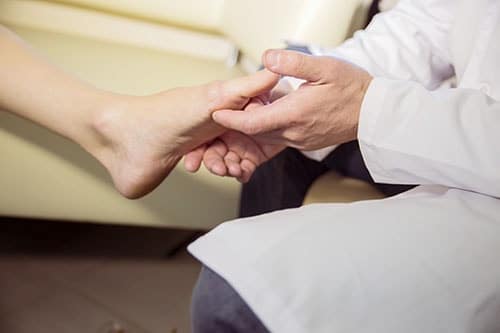Diabetic Foot Care
If you have diabetes, even minor injuries such as cuts and blisters can evolve into serious conditions. That’s why daily monitoring and regular checkups are so important with this disease.

Why Diabetes Is So Dangerous for Feet
The main problem is sugar. High levels of glucose in the bloodstream slowly and progressively damage the nerves and blood vessels in the extremities. Over months and years, you gradually lose the ability to feel pain or judge temperature in your feet, meaning cuts, blisters, and sores can go unnoticed. Reduced circulation can’t close the wounds or fight off infections as well as they used to either.
This can cause harmful and infected ulcers, and in the most severe cases even progressively worsening bone injuries and foot deformity (Charcot foot.) Other consequences include loss of bone density and skin moisture.
Diabetic Foot Care
At the Community Foot Clinic of McPherson, Dr. Trent Timson and his team offer comprehensive diabetic foot care, including both preventative measures and more aggressive treatment for ongoing problems like diabetic wounds and Charcot foot deformities. Services include:
- Diabetic foot checkups. This may include maintenance care for issues such as corns, calluses and toenails, alongside testing your nerve and circulatory health to identify future risks.
- Custom orthotics and diabetic footwear. Many people with diabetes—especially those with a history of foot problems—can benefit from prescription orthotics and footwear designed to keep their feet safe, improve stability and reduce impacts and shear forces that can cause ulceration and bone fractures.
- Wound care. If an ulcer does form, you must act quickly to prevent it from progressing into a more serious problem. We will clean, medicate, and protect the wound to help it heal as quickly as possible and limit the risk of infection.
- If complications become severe, you may require surgery to prevent the spreading of infection or reconstruct an unstable Charcot foot deformity. Whenever possible, we do everything we can to prevent amputation and preserve as much function as possible.
Tips for Daily Diabetic Foot Care at Home
Fortunately, by taking proper care of your feet, you can avoid the most serious, potentially life-threatening problems.
- Control diabetes. First and foremost, test your sugar regularly and keep your levels as under control as possible.
- Closely inspect your feet every day. Don’t forget to check nails and between toes, too. You may notice scratches, cuts, bruising, or areas of redness, warmth, cracking, or swelling. Such issues must be addressed right away to prevent further complications.
- Wear proper shoes. Closed-toed shoes protect against stubs, puncture wounds, and other injuries. Never go barefoot, even indoors. Always inspect the inside of your shoes for foreign debris, and don’t wear the same pair every day—give each a chance to dry out.
- Wear proper socks. Avoid socks that are too tight, have elastic bands around the ankles, or have sharp seams. Stick with breathable fabrics.
- Wash your feet daily. Use mild soaps and warm (not hot) water. Test water with a thermometer. Pat lightly to dry, and apply lotion afterward to prevent cracking.
- Keep the blood flowing. Two or three times per day, wiggle your toes and rotate your ankles for about 5 minutes. Avoid sitting cross-legged.
- Trim nails properly. Go straight across; don’t cut the corners. File any edges close to skin.
- Quit smoking. Smoking severely reduces the body’s ability to heal itself.
- Manage body weight. Healthy weight not only helps control diabetes, but reduces daily pressure on your feet and ankles.
© Community Foot Clinic of McPherson. All Rights Reserved.
Privacy Policy | Terms & Conditions
Web Design by CP Solutions
Marketed by VMD Services

